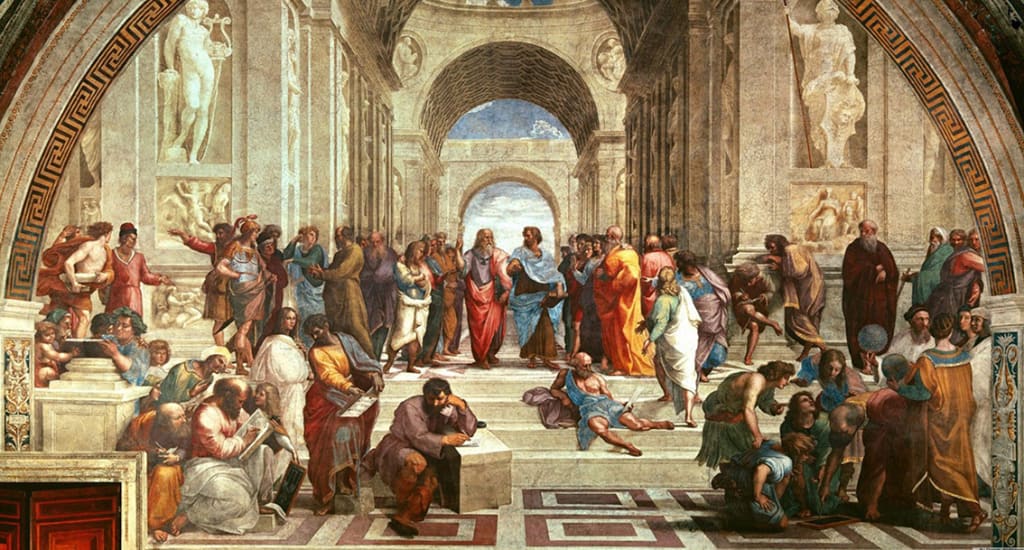Are the Many, Wiser than the Few
Examination of Collective Wisdom

The concept of collective wisdom can be traced back to Aristotle’s famous book “Politics”, in which he states that “it is possible that the many, though not individually good men, yet when they come together may be better, not individually but collectively, than those who are so, just as public dinners to which many contribute are better than those supplied at one man's cost". Since then, the idea has been expanded upon by generations of academics and reformers and has fuelled democratic theory. In this essay I will aim to explain more thoroughly, what Aristotle meant when he spoke of collective wisdom. I will do this by examining the relevant passages of “Politics”, but also looking at a few other academics that have researched this concept more recently. I will then move on to discuss the many arguments for and against this idea and its effect on modern democracy. Here I will look at works by Bryan Caplan and Helene Landemore among others, to present how this concept's implications is still heavily debated among academics.
Collective Wisdom
To more closely examine Aristotle’s perception of collective wisdom, I will refer to the relevant passages of “The Politics”, as it, or rather Aristotle, provides several examples which will aid in illustrating his concept of the wisdom of crowds. In The Politics 3 1281b (Jowett, 1885), he states “it is possible that the many, though not individually good men, yet when they come together may be better, not individually but collectively, than those who are so, just as public dinners to which many contribute are better than those supplied at one man's cost". What Aristotle is saying here is that if a dinner were to be contributed to by many different people, each of them bringing something of their own, the result will be that it would have a multitude of dishes and treats because each man would inject his own preferences into the food that he is bringing. When all the individual parts (the different foods and drinks) are joined together as a whole it becomes a feast that accommodates many tastes and so is more likely to satisfy anyone who partakes in it. There are however several situations in which the outcome of the dinner could disappoint, like for example, if none of the contributors know anything about each other or what they will prepare. This could result in the dinner consisting of, as Ober (2009) puts it “6 courses of pasta salad”. Another issue which is discussed, is that of freeriders preparing a poor meal expecting everyone else to make fine and expensive dishes. If all of the constituent parts have this approach or fear that they will pay more and be “stuck with the bill”, then everyone will contribute a poor dish resulting in the whole dinner being disappointing. The solution to this, provided by Aristotle, is to ensure that the correct conditions are in place. One of these conditions is social knowledge, in other words, each contributor must have at least some knowledge of the other contributors and an idea of what their contribution will be. The other is the presence of norms, by which he means that there has to be a common norm of providing good food and drink, so no one is incentivised to freeride as this could result in the individual suffering consequences. He then makes the claim that “This is why the many judge better in regard to musical works and those of the poets, for some judge a particular part , while all of them judge the whole''. By this he means that a group will consist of many different minds and types of character which will be better at judging poetry and music. The reason for this is that a diverse group of people will have a broader range of sensibilities and experiences and so have more expertise in judging music and poetry than an individual. The last quote I will discuss is found in The Politics 3 1286a, where he states that “the multitude is more incorruptible—just as the larger stream of water is purer, so the mass of citizens is less corruptible than the few; and the individual's judgement is bound to be corrupted when he is overcome by anger or some other such emotion, whereas in the other case it is a difficult thing for all the people to be roused to anger and go wrong together”. The case Aristotle is making here is that he believes that a crowd is less likely to be swept away in a short burst of emotion and that new ideas are unlikely to be able to penetrate and corrupt them as easily as they could an individual. Many other academics have observed the concept known as “collective wisdom” or more modernly called “wisdom of the crowd”, one of the more prominent examples is Sir Francis Galton (Fleenor, 2006). In 1907 he performed an experiment in which he instructed a group of 787 villagers to estimate the weight of an ox. The result was that none of the participants were able to assess the precise weight, however after having averaged their responses Sir Galton found that it was nearly exact. It was concluded that the reason for this is that individuals pool their knowledge and abilities as a group and arrive at the correct conclusions, which each member of the group individually could not have done. This would seem to reflect Aristotle’s assumption that “when they have come together, the multitude is like a single person, yet many-footed and many-handed and possessing many sense-capacities“.Similar findings have been presented by Berdahl, A., Torney, C., Ioannou, C., Faria, J. and Couzin, I. (2013), who studied a type of fish known as Golden Shiner fish. They show a preference for shade, and so move around the water trying to find the shadiest part. While examining their movement they found that individual fish were incredibly inept at finding shade, as they were only able to recognize the brightness in the part they were, but could not identify a vector that would lead them into more shade. Only when in a shoal could the fish not only recognize the brightness in their location but could also design a route that would lead them into more shade.
It has to be recognized however, that the world in which Aristotle lived was very different from today, the population of Athens was considerably smaller than that of modern nations. While Athens had a population of several thousand, we have populations of millions, hundreds of millions or in some cases even billions. Additionally, Aristotle’s electorate was severely restricted, only including adult men, which would mean that only 30% of the population would actually be allowed to vote. This means that the democratic process was limited to a certain amount of ideas, experiences and biases. In the modern world the electorate is composed of a hugely diverse population in terms of ethnicity, heritage and political affiliation. This is echoed by Landemore (2012) who states that “The first novelty lies in the sheer scope on which collective wisdom is supposed to work, involving millions of individuals rather than the few thousands at best that Aristotle had in mind”, but she also makes another claim concerning the theory of the wisdom of crowds. According to Aristotle, this collective wisdom can only exist in the presence of deliberation and exchange of ideas. While he was most likely referring to Athenian assemblies, it would be difficult to make the case that Athenian style assembly deliberation happens on a huge scale in modern day democracies. Landemore makes the case that people nowadays are being discouraged from voting like other people, and concerning themselves with just their own vote. As an example of this she mentions the law prohibiting publication of election results in eastern Canada, while polls are still open in the West. This would contradict the main idea of the wisdom of crowds, the exchange of ideas and influence of other people on the individuals ideas.
Wisdom of Crowds and Democracy
As this essay is not expansive enough to discuss the issue of collective wisdom in its entirety and as the implications and impacts of it are incredibly diverse and still extremely debated, this essay will try to present some of the key academic sources on this issue. To examine the effect of collective wisdom on modern democracy, it is important to look at some arguments that have been made against its effectiveness nowadays. One argument which was mentioned in “Democratic Reason” (Landemore, 2013), states that because of the incentive structure of our democracies, voters are discouraged from being knowledgeable about who they are voting for. The reason for this is that it takes a substantial amount of time and dedication to be informed on the different elections, this is faced with the perceived unimportance of a single vote and so people decide that it is not worth it. The result is that people vote almost at random or with very little thought, and so undermine collective wisdom because that would require everyone to actually try to achieve a good outcome. If we were to relate that to Sir Francis Galton’s study, it would be like all the participants, just picking random numbers, which would result in the experiment being a failure. This claim is also supported by Bryan Caplan (2007) in his famous book “The Myth of the Rational Voter”, where he states that people are not only disinterested in the voting process, but also suffer from severe biases that influence their voting behaviour. One example of this is Anti-market bias, which exists when people see themselves as victims of market mechanisms, corporations and profits are seen as only benefiting the rich and people feel like the economic mechanisms of the market do not do anything for them. Another important bias that is unquestionably present in modern day, is anti-foreign bias. This occurs when voters underestimate the value of immigration and foreign labour, and one explanation is that people see their own nation as being in a race against other nations, and trade as a zero-sum game, rather than something that benefits everyone. He then moves on to compare the attitudes of economists with attitudes of regular voters, where he presents evidence that there is a huge divide between what voters think and economists think of the causes to economic problems in the country. An example of this is that 74% of voters believe that rises in gas prices is attributed to the greed of oil companies, whereas only 11% of economists reached that conclusion. Based on this he makes the argument that democracies are bound for decisions that will be harmful to the country, because everyone is constantly making voting decisions based on wrong ideas and influenced by biases that cause people to be misled. The challenge to this argument, is that based on research of voting behaviour, it has been shown that on many occasions people do not vote selfishly. Bowles and Gintis found that “groups exhibit a much higher rate of cooperation than can be expected assuming the standard economic model of the self-regarding actor, and this is especially the case when subjects are given the option of incurring a cost to themselves in order to punish free riders.” This is attributed to the long term benefits of being selfless, the example the authors mention, is how a hunter will be better off giving away some of his food to other members of the tribe, as the tribe will then cooperate with him and give him something in return. This outweighs the short term benefits of keeping all of the meat for himself, and this explains why voters vote against their own interests.
Sir Francis Galton’s research is interesting, but now I would like to examine how this is relevant to the modern political setting. His research was based around a very objective, non-controversial issue, the weight of an ox. And as Surowiecki (2004) claims in his book, people perform much better when faced with questions that have definite answers, like mathematical questions. Now however, in the world of the internet, we have witnessed a huge polarization of the population, is collective wisdom still effective when faced with the modern challenges of social media and polarization? In a 2017 study by Shi, F., Teplitskiy, M., Duede, E. and Evans, J., the researchers looked at the website Wikipedia, which is unique due to its “monopoly of reference attention” as the authors call it. Being the 5th most visited website, and containing over 5 million articles on many different issues, it is one of the most important sources of knowledge for many. Additionally, every subject has only one article, even subjects that could be considered controversial like abortion, communism or free trade. More than one person is likely to want to contribute to the article, and this can result in two or more people with different political ideologies having to work together. They found that when two or more motivated partisan individuals cooperated on an article, this resulted in focused debate between them, and the article they produced was of much better quality in terms of comprehensiveness and being factual. This however, happens to individuals, and it needs to be examined how polarized groups of people interact with one another, as that is the more meaningful aspect in regards to democracy. A study conducted by Becker, J., Porter, E. and Centola, D. (2019) presented some interesting findings, they found that even though “an increase of in-group belief similarity generates improvements at both the group level and the individual level”, between groups beliefs become more polarized. Another issue that they discuss is the effect of what they call “network centralization”, in other words, the existence of individuals who are “disproportionately central”. This central position on the social stage allows these people to influence the public’s beliefs. They found that under conditions of extreme beliefs and network centralization, collective wisdom can be undermined or even fail completely. A form of this is also mentioned in Surowiecki’s book “The Wisdom of Crowds” where he discusses the effect of WQ which describes a situation in which members of the group cease thinking for themselves for the most WQ, and mostly listen to signals given by other members of the group.
Conclusion
In this essay I have examined Aristotle’s concept of the “wisdom of crowds” as presented in his book “Politics”. I discussed the different arguments and comparisons he makes in the passages of the book, and explained what these entail for the theory of collective wisdom. I then moved on to discuss other, more recent, research and debate surrounding this topic. This included Sir Francis Galton’s statistical experiment in which he asked villagers to assess the weight of an ox, and discovered that while none of their answers were correct, when averaged, provided an incredibly precise assessment of the weight. Another example was the research of Berdahl, A., Torney, C., Ioannou, C., Faria, J. and Couzin, I. who showed how Golden Shiner fish are much more effective when they are in a shoal than when searching for shade individually. In the second part of the essay I discussed various challenges to the concept of collective wisdom, as well as the responses to them. This served the purpose of showing how debated the idea still is and how its implications for democracy are still very contested. Here many studies were discussed, including research conducted by Shi, F., Teplitskiy, M., Duede, E. and Evans, J., which examined the activity of Wikipedia users and how they interact while writing articles and cooperating with other people who are politically opposed to them. A prominent book opposing the idea of the wisdom of crowds, is Bryan Caplan’s “The Myth of the Rational Voter”, which looks at how people are consistently influenced by biases, and as Caplan argues, repeatedly make erroneous voting decisions because of their misinformation. Based on this he believes that collective wisdom in the modern setting is not a viable concept. This essay has aimed to not only explain the idea of collective wisdom as presented by Aristotle, but to also show how debated it is in modern society and what the different implications could be for modern democracy based on the arguments made by various academics. This essay has presented several viewpoints to illustrate how complex the implications could be, and that academics are still not in agreement over the existence or effectiveness of the wisdom of crowds.
References
Becker, J., Porter, E. and Centola, D., 2019. The Wisdom Of Partisan Crowds.
Berdahl, A., Torney, C., Ioannou, C., Faria, J. and Couzin, I., 2013. Emergent Sensing of Complex Environments by Mobile Animal Groups. Science, 339(6119), pp.574-576.
Caplan, B., 2007. The Myth Of The Rational Voter. Princeton: Princeton University Press.
Fleenor, J., 2006. The wisdom of crowds: why the many are smarter than the few and how collective wisdom shapes business, economies, societies and nations. Personnel Psychology, 59(04).
Jowett, B., 1885. The Politics Of Aristotle. Oxford: Clarendon.
Landemore, H. and Elster, J., 2012. Collective Wisdom. Cambridge [etc.]: Cambridge university press.
Landemore, H., 2013. Democratic Reason. Princeton: Princeton University Press.
Ober, J., 2009. An Aristotelian middle way between deliberation and independent-guess aggregation. APSA,
Shi, F., Teplitskiy, M., Duede, E. and Evans, J., 2017. The wisdom of polarized crowds. Nature Human Behaviour, 3(4), pp.329-336.
Surowiecki, J., 2004. The Wisdom Of Crowds. Anchor: Doubleday.





Comments
There are no comments for this story
Be the first to respond and start the conversation.